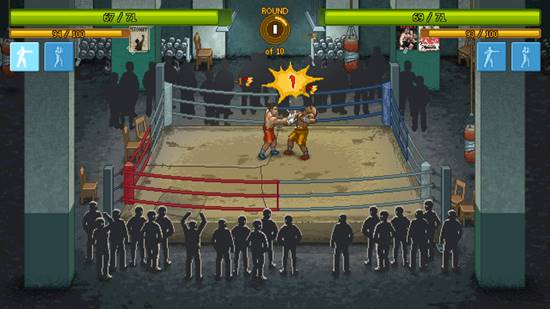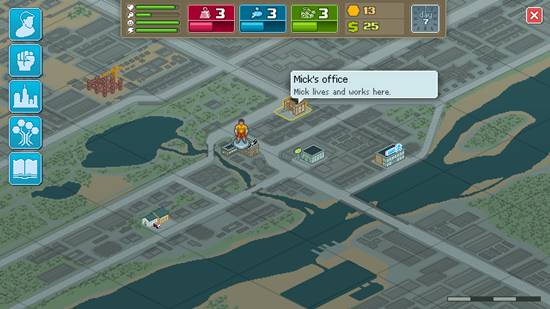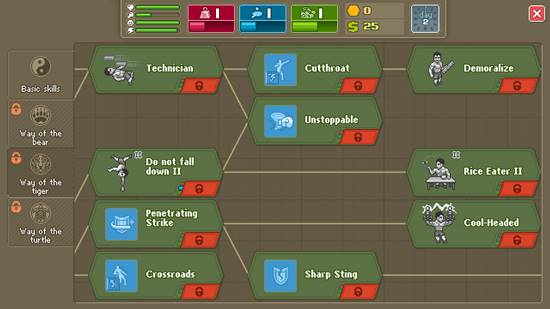Publisher: tinyBuild Games
Developer: Lazy Bear Games
Medium: Digital
Players: 1
Online: No
I spent a bit of time with Punch Club on PC this weekend, after its early release stemming from a successful ?Twitch Plays? marketing run last week. So far I?ve found it to be pretty unique, generally charming, and at times a bit frustrating. It?s a little too grindy for my tastes, but I think I?ll stick with it since it really doesn?t take a great deal of concentration to get through. This isn?t a review, per se, but more a collection of my thoughts after dumping a handful of hours into the fighting sim.
That?s right, Punch Club is a fighting simulator. If you?re like me when I heard this term, you?re probably thinking, what the hell is a fighting sim? Well, I?ll attempt to explain. In Punch Club you?ll guide your character?s actions throughout the day, which can consist of working out, eating, sleeping, working and fighting. There?s some side activities thrown in, but these are the major activities you?ll be focused on.
 Everything you do in the game takes up a certain amount of time, so you?ll need to manage your activities and plan out a schedule in order to be efficient. Again, this isn?t overly complicated, you?ll generally get the handle on when to work, when to fight, when to train and so on. Sleeping and eating are generally dictated by when your character runs out of energy or gets hungry, which will prevent you from doing anything until you satisfy either of those issues.
Everything you do in the game takes up a certain amount of time, so you?ll need to manage your activities and plan out a schedule in order to be efficient. Again, this isn?t overly complicated, you?ll generally get the handle on when to work, when to fight, when to train and so on. Sleeping and eating are generally dictated by when your character runs out of energy or gets hungry, which will prevent you from doing anything until you satisfy either of those issues.
This all revolves around when your character?s next fight is scheduled, which is generally over the span of three or two in-game days. Ideally, at fight day, you?ll want to have pushed your strength, agility, and stamina stats as high as possible before the fight, so you?re performing at peak levels. It?s unrealistic to focus on all three stats when working out, so generally you try to build up one, and maintain some sort of decent level for the other two. This becomes challenging since those stats degrade when a day completes, so there?s always some sort of push and pull going on, which is again where the time management aspect becomes important.
 The developers have struck a pretty good balance with the gains and losses that each day can bring, but progress can feel minimal at first. You have to become accustomed to losing matches, which will definitely happen, but can still provide some benefit. Every fight you complete, whether you win or lose, will earn you skill points, which can then be used to unlock specific abilities or attacks on an ever expanding skill tree. These abilities are also tied into your overall strength, agility, and stamina levels, so depending on which of the three you decide to focus on, your skill tree path will reflect that specialty.
The developers have struck a pretty good balance with the gains and losses that each day can bring, but progress can feel minimal at first. You have to become accustomed to losing matches, which will definitely happen, but can still provide some benefit. Every fight you complete, whether you win or lose, will earn you skill points, which can then be used to unlock specific abilities or attacks on an ever expanding skill tree. These abilities are also tied into your overall strength, agility, and stamina levels, so depending on which of the three you decide to focus on, your skill tree path will reflect that specialty.
While the plot of Punch Club is a bit light, it?s ability to send up just about every major action movie of the 80?s and 90?s is almost unparalleled. Honestly, the only thing missing here is a Cannon logo when the game boots up. You?ll have obvious references to stuff like Rocky, with slightly more obscure references tossed in, including a nod to Steven Seagal?s character from Under Siege. Other somewhat familiar faces, including a unique send off of TMNT, pop up throughout, which certainly adds to the nostalgia factor here. Add to that the charming blend of chiptunes style music, and 16-bit style graphics, and I think Punch Club certainly nails the time period aesthetic it?s going for.
 So would I suggest checking out Punch Club if you find the idea of a fighting simulator intriguing? Sure, provided you can acclimate to the more tedious aspects of managing stat bars and schedules, which might not require a great deal of concentration but still involve a certain level of babysitting that I haven?t found appealing so far. There are enough unique hooks in Punch Club?s gameplay to keep me going however, and I certainly dig the humor and overall style of the game. And quite frankly, I?m a sucker for nostalgic, B-movie styled nonsense, which Punch Club certainly gets right.
So would I suggest checking out Punch Club if you find the idea of a fighting simulator intriguing? Sure, provided you can acclimate to the more tedious aspects of managing stat bars and schedules, which might not require a great deal of concentration but still involve a certain level of babysitting that I haven?t found appealing so far. There are enough unique hooks in Punch Club?s gameplay to keep me going however, and I certainly dig the humor and overall style of the game. And quite frankly, I?m a sucker for nostalgic, B-movie styled nonsense, which Punch Club certainly gets right.

